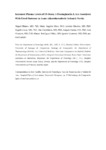Increased plasma levels of 15-deoxyDelta prostaglandin J2 are associated with good outcome in acute atherothrombotic ischemic stroke

View/
Use this link to cite
http://hdl.handle.net/2183/40673Collections
- Investigación (FCS) [1293]
Metadata
Show full item recordTitle
Increased plasma levels of 15-deoxyDelta prostaglandin J2 are associated with good outcome in acute atherothrombotic ischemic strokeAuthor(s)
Date
2005-05-05Citation
Blanco M, Moro MA, Dávalos A, Leira R, Castellanos M, Serena J, Vivancos J, Rodríguez-Yáñez M, Lizasoain I, Castillo J. Increased plasma levels of 15-deoxyDelta prostaglandin J2 are associated with good outcome in acute atherothrombotic ischemic stroke. Stroke. 2005 Jun;36(6):1189-94.
Abstract
[Abstract]
Background and purpose: The 15-deoxyDelta prostaglandin J2 (15-dPGJ2) is an anti-inflammatory prostaglandin that has been proposed to be the endogenous ligand of peroxisome proliferator-activated receptor-gamma (PPARgamma), a nuclear receptor that can exert potent anti-inflammatory actions by repressing inflammatory genes when activated. It has been suggested that 15-dPGJ2 could be beneficial in neurological disorders in which inflammation contributes to cell death such as stroke.
Methods: We investigated the relationship between plasma levels of 15-dPGJ2 and early neurological deterioration (END), infarct volume, and neurologic outcome in 552 patients with an acute stroke admitted within 24 hours after symptoms onset.
Results: Median [quartiles] plasma 15-dPGJ2 levels on admission were significantly higher in patients than in controls (60.5 [11.2 to 109.4] versus 5.0 [3.8 to 7.2] pg/mL; P<0.0001). Levels of this prostaglandin were also significantly higher in patients with vascular risk factors (history of hypertension or diabetes) and with atherothrombotic infarcts (113.9 [81.6 to 139.7] pg/mL), than in those with lacunar (58.7 [32.7 to 86.2] pg/mL), cardioembolic (12.1 [6.5 to 39.2] pg/mL), or undetermined origin infarcts (11.4 [5.6 to 24.3] pg/mL) (P<0.0001). In the subgroup of patients with atherothrombotic infarcts, the adjusted odds ratio of END and poor outcome for 1 pg/mL increase in 15-dPGJ2 were 0.95 (95% CI, 0.94 to 0.97) and 0.97 (95% CI, 0.96 to 0.98), respectively. In a generalized linear model, by 1 U increase in 15-dPGJ2, there was a reduction of 0.47 mL (95% CI, 0.32 to 0.63) in the mean estimated infarct volume.
Conclusions: Increased plasma 15-dPGJ2 concentration is associated with good early and late neurological outcome and smaller infarct volume. These findings suggest a neuroprotective effect of 15-dPGJ2 in atherothrombotic ischemic stroke.
Keywords
Atherosclerosis
Diabetes mellitus
Hypertension
Inflammation
Stroke
Diabetes mellitus
Hypertension
Inflammation
Stroke
Editor version
ISSN
0039-2499





